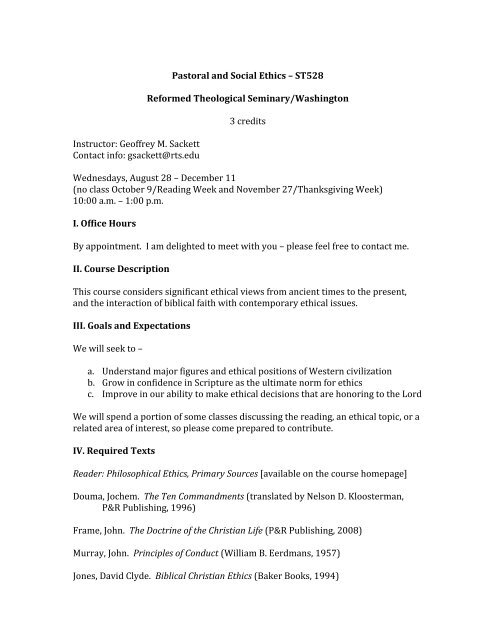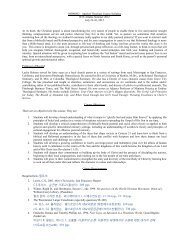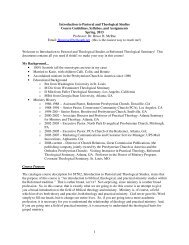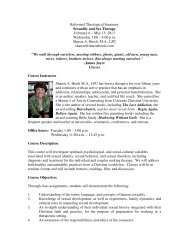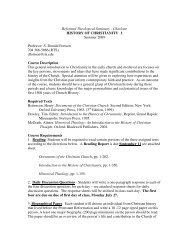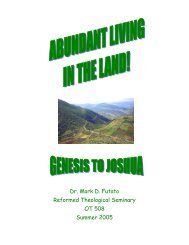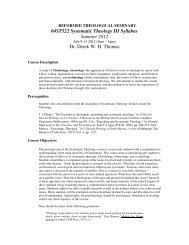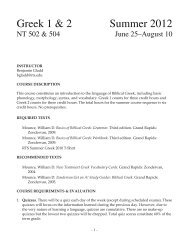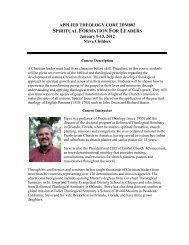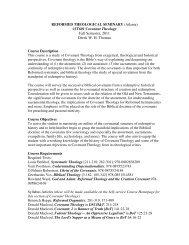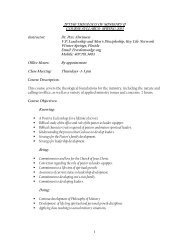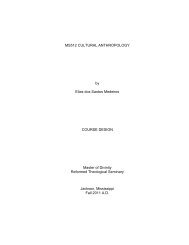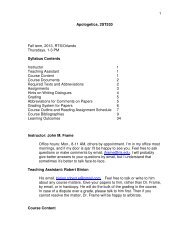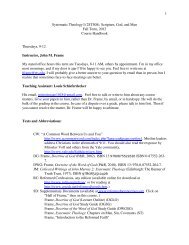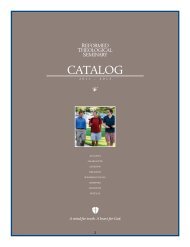Pastoral and Social Ethics â ST528 Reformed Theological Seminary ...
Pastoral and Social Ethics â ST528 Reformed Theological Seminary ...
Pastoral and Social Ethics â ST528 Reformed Theological Seminary ...
You also want an ePaper? Increase the reach of your titles
YUMPU automatically turns print PDFs into web optimized ePapers that Google loves.
Instructor: Geoffrey M. Sackett<br />
Contact info: gsackett@rts.edu<br />
<strong>Pastoral</strong> <strong>and</strong> <strong>Social</strong> <strong>Ethics</strong> – <strong>ST528</strong><br />
<strong>Reformed</strong> <strong>Theological</strong> <strong>Seminary</strong>/Washington<br />
3 credits<br />
Wednesdays, August 28 – December 11<br />
(no class October 9/Reading Week <strong>and</strong> November 27/Thanksgiving Week)<br />
10:00 a.m. – 1:00 p.m.<br />
I. Office Hours<br />
By appointment. I am delighted to meet with you – please feel free to contact me.<br />
II. Course Description<br />
This course considers significant ethical views from ancient times to the present,<br />
<strong>and</strong> the interaction of biblical faith with contemporary ethical issues.<br />
III. Goals <strong>and</strong> Expectations<br />
We will seek to –<br />
a. Underst<strong>and</strong> major figures <strong>and</strong> ethical positions of Western civilization<br />
b. Grow in confidence in Scripture as the ultimate norm for ethics<br />
c. Improve in our ability to make ethical decisions that are honoring to the Lord<br />
We will spend a portion of some classes discussing the reading, an ethical topic, or a<br />
related area of interest, so please come prepared to contribute.<br />
IV. Required Texts<br />
Reader: Philosophical <strong>Ethics</strong>, Primary Sources [available on the course homepage]<br />
Douma, Jochem. The Ten Comm<strong>and</strong>ments (translated by Nelson D. Kloosterman,<br />
P&R Publishing, 1996)<br />
Frame, John. The Doctrine of the Christian Life (P&R Publishing, 2008)<br />
Murray, John. Principles of Conduct (William B. Eerdmans, 1957)<br />
Jones, David Clyde. Biblical Christian <strong>Ethics</strong> (Baker Books, 1994)
Adams, Jay. Marriage, Divorce, <strong>and</strong> Remarriage in the Bible (Zondervan, 1980)<br />
VanDrunen, David. Bioethics <strong>and</strong> the Christian (Crossway, 2009)<br />
Westminster St<strong>and</strong>ards (Confession <strong>and</strong> Larger <strong>and</strong> Shorter Catechisms)<br />
(available online at http://www.reformed.org/documents/index.html)<br />
Heidelberg Catechism<br />
(available online at http://www.reformed.org/documents/index.html)<br />
Reader: Essays on Ethical Issues [available on the course homepage]<br />
Recommended (not required)<br />
Rachels, James. The Elements of Moral Philosophy (McGraw-Hill, 2010)<br />
Frankena, William. <strong>Ethics</strong> (Pearson, 1988)<br />
V. Assignments<br />
We will discuss the assignments more fully in class.<br />
1. Midterm Exam. A take-home exam that covers lecture <strong>and</strong> reading material<br />
from the first day of class through <strong>and</strong> including class on Oct 16. The<br />
Midterm will be distributed on October 16 <strong>and</strong> is due one week later on<br />
October 23.<br />
a. The exam must be proctored by a pastor, an elder, or your church<br />
secretary.<br />
b. The exam must be word-processed.<br />
c. The exam must be returned to the instructor by the proctor as a MS<br />
Word document by email (gsackett@rts.edu). PDFs <strong>and</strong> other formats<br />
will not be accepted.<br />
2. Adams Précis. A 4 page précis of Adams’ Marriage, Divorce <strong>and</strong> Remarriage<br />
in the Bible.<br />
a. Summarize the main points, use of scripture, <strong>and</strong> the reasoning<br />
Adams uses in support of his claims<br />
b. Note: this assignment is purely explanatory; you are not to evaluate or<br />
appraise Adams’ arguments. That is, you are to name <strong>and</strong> explain<br />
Adams’ claims, rather than appreciate or critique them.<br />
c. Due September 11<br />
3. VanDrunen Outline. A 6-7 page outline of VanDrunen’s Bioethics <strong>and</strong> the<br />
Christian. Outline chapters 1-9 (i.e., pp 23-238).
a. Write in complete sentences, though use Roman numerals to<br />
distinguish points, sub-points, etc.<br />
b. Due November 20<br />
4. Final Exam. An in-class exam on December 11 that covers lecture <strong>and</strong><br />
reading material from October 23 through <strong>and</strong> including class on<br />
December 4.<br />
a. Word-processing the exam is highly preferred.<br />
5. Quizzes. Five total (see schedule below) based on the reading due that day.<br />
Next Assignment: Your Choice (Research Paper or Analytical Summaries):<br />
Or:<br />
6. Research Paper. A 10-12 page paper that allows the student to argue a<br />
thesis on a topic of his or her interest. There are two graded components to<br />
this assignment: the Research Prospectus <strong>and</strong> the Final Paper.<br />
a. Research Prospectus. The Prospectus will include four components:<br />
i. A thesis statement<br />
ii. A method statement<br />
iii. Two 500 word expository/evaluative summaries of two<br />
significant works that will figure prominently in your final<br />
paper<br />
iv. A brief bibliography of the 3-4 most significant works that will<br />
figure into your research (two of those sources may include the<br />
works considered in roman numeral iii). NOTE: your final<br />
paper must include a lengthier bibliography—see below.<br />
v. Due November 6<br />
b. Final Paper. The final paper must include:<br />
i. A thesis paragraph that will include your thesis statement <strong>and</strong><br />
method statement<br />
ii. Argumentation, evidence, counter-claims, counter-evidence<br />
iii. A minimum of 6 scholarly references<br />
iv. Due December 18<br />
7. Analytical Summaries. Analytical Summaries of two essays that take<br />
opposing sides of an ethical issue. Each Summary will be 2-3 pages <strong>and</strong> will<br />
include two sections: Summary Proper <strong>and</strong> Evaluation.<br />
a. Summary Proper. Address the following points:<br />
i. Summarize the text’s main point(s) or thesis (theses)<br />
ii. What evidence does the author adduce in favor of his position?<br />
iii. What counter evidence does the author consider?<br />
iv. How is scripture used in the author’s argument?<br />
b. Evaluation. Address the following points:
i. Evaluate the author’s argument, based on (a) the author’s use<br />
of scripture <strong>and</strong> (b) the reasoning used to support the author’s<br />
thesis/main point(s)<br />
ii. Evaluate the author’s h<strong>and</strong>ling of counter evidence.<br />
iii. Identify assumptions made by the author in presenting his case<br />
iv. Overall, whose argument is strongest? Why? How could both<br />
arguments have been improved?<br />
Evaluation:<br />
1. Midterm Exam – 20 points<br />
2. Final Exam – 20 points<br />
3. VanDrunen Outline – 10 points<br />
4. Adams Précis – 10 points<br />
5. Quizzes – (5 at 2 points each) = 10 points<br />
And Either:<br />
Or:<br />
6. Research Paper<br />
a. Research Prospectus – 10 points<br />
b. Final paper – 20 points<br />
7. Analytical Summaries<br />
a. Analytical Summary of First Essay – 15 points<br />
b. Analytical Summary of Second Essay – 15 points<br />
VI. Readings <strong>and</strong> Schedule<br />
A more detailed schedule will be distributed in class, but this gives a good indication<br />
of the direction we are heading.<br />
August 28<br />
Course introduction: Philosophy <strong>and</strong> <strong>Ethics</strong>; Theology <strong>and</strong> <strong>Ethics</strong>; Christ <strong>and</strong> Culture<br />
Readings: None.<br />
September 4<br />
Lecture topics: Greek Philosophical <strong>Ethics</strong>: Plato, Aristotle, Epicurus<br />
Readings: select readings from Reader: Philosophical <strong>Ethics</strong>, Primary Sources
QUIZ (SEPT 4)<br />
September 11<br />
Lecture topics: Medieval <strong>Ethics</strong>: Augustine, Aquinas, Ockham, Scotus<br />
Readings: select readings from Reader: Philosophical <strong>Ethics</strong>, Primary Sources<br />
ADAMS PRÉCIS DUE (SEPT 11)<br />
September 18<br />
Lecture topics: Modern ethics: Kant, Mill<br />
Readings: select readings from Reader: Philosophical <strong>Ethics</strong>, Primary Sources<br />
QUIZ (SEPT 18)<br />
September 25<br />
Lecture Topics: Contemporary ethics: Singer, Rawls, Feminist approaches<br />
Readings: select readings from Reader: Philosophical <strong>Ethics</strong>, Primary Sources<br />
October 2<br />
Lecture Topics: Introduction to Christian ethics: God <strong>and</strong> Scripture; Christ <strong>and</strong><br />
Culture<br />
Readings: Jones, Biblical Christian <strong>Ethics</strong> (pp. 11-124);<br />
October 9<br />
No class<br />
October 16<br />
Lecture Topics: Doctrines, themes, <strong>and</strong> concepts in scriptural ethics<br />
Readings: Douma, The Ten Comm<strong>and</strong>ments (pp. 358-390; 1-12); Murray, Principles<br />
of Conduct (pp. 11-122); Frame, The Doctrine of the Christian Life (pp. 131-236; 239-<br />
250; 271-360)<br />
MIDTERM EXAM DISTRIBUTED (OCT 16)<br />
October 23
Lecture Topics: 1 st Comm<strong>and</strong>ment; 2 nd Comm<strong>and</strong>ment<br />
Readings: Douma (pp. 15-72); Frame (pp. 405-486)<br />
MIDTERM EXAM DUE (OCT 23)<br />
October 30<br />
Lecture Topics: 3 rd Comm<strong>and</strong>ment; 4 th Comm<strong>and</strong>ment<br />
Readings: Douma (pp. 73-160); Frame (pp. 487-574)<br />
November 6<br />
Lecture Topics: 5 th Comm<strong>and</strong>ment<br />
Readings: Douma (pp. 161-206); Frame (pp. 575-683)<br />
RESEARCH PAPER PROSPECTUS DUE (NOV 6)<br />
November 13<br />
Lecture Topics: 6 th Comm<strong>and</strong>ment<br />
Readings: Douma (pp. 207-242); Frame (pp. 684-745)<br />
November 20<br />
Lecture Topics: 7 th Comm<strong>and</strong>ment<br />
Readings: Douma (pp. 243-282); Frame (pp. 746-795)<br />
VANDRUNEN OUTLINE DUE (NOV 20)<br />
November 27<br />
No class<br />
December 4<br />
Lecture Topics: 8 th Comm<strong>and</strong>ment; 9 th Comm<strong>and</strong>ment; 10 th Comm<strong>and</strong>ment<br />
Readings: Douma (pp. 285-353); Frame (pp. 796-850)<br />
December 11<br />
IN CLASS FINAL EXAM
December 18<br />
RESEARCH PAPER OR ANALYTICAL SUMMARIES DUE (DEC 18)<br />
Course Objectives Related to MDiv* Student Learning Outcomes<br />
Course:<br />
<strong>Pastoral</strong> <strong>and</strong> <strong>Social</strong> <strong>Ethics</strong> (<strong>ST528</strong>)<br />
Professor: Geoff Sackett<br />
Campus: Washington<br />
Date: May 21, 2013<br />
MDiv* Student Learning Outcomes<br />
In order to measure the success of the MDiv curriculum, RTS has defined<br />
the following as the intended outcomes of the student learning process.<br />
Each course contributes to these overall outcomes. This rubric shows the<br />
contribution of this course to the MDiv outcomes.<br />
*As the MDiv is the core degree at RTS, the MDiv rubric will be used in this<br />
Articulatio<br />
n<br />
(oral &<br />
written)<br />
Scripture<br />
<strong>Reformed</strong><br />
Theology<br />
Sanctificati<br />
on<br />
syllabus.<br />
Broadly underst<strong>and</strong>s <strong>and</strong> articulates knowledge,<br />
both oral <strong>and</strong> written, of essential biblical,<br />
theological, historical, <strong>and</strong> cultural/global<br />
information, including details, concepts, <strong>and</strong><br />
frameworks.<br />
Significant knowledge of the original meaning of<br />
Scripture. Also, the concepts for <strong>and</strong> skill to<br />
research further into the original meaning of<br />
Scripture <strong>and</strong> to apply Scripture to a variety of<br />
modern circumstances. (Includes appropriate use<br />
of original languages <strong>and</strong> hermeneutics; <strong>and</strong><br />
integrates theological, historical, <strong>and</strong><br />
cultural/global perspectives.)<br />
Significant knowledge of <strong>Reformed</strong> theology <strong>and</strong><br />
practice, with emphasis on the Westminster<br />
St<strong>and</strong>ards.<br />
Demonstrates a love for the Triune God that aids<br />
the student’s sanctification.<br />
Rubric<br />
‣ Strong<br />
‣ Moderate<br />
‣ Minimal<br />
‣ None<br />
Strong<br />
Strong<br />
Strong<br />
Strong<br />
Mini-Justification<br />
Tests, quizzes, short papers,<br />
<strong>and</strong> research paper test<br />
students’ knowledge <strong>and</strong><br />
abilities.<br />
Scripture is the basis of our<br />
thinking about ethics.<br />
Students interact significant<br />
with the <strong>Reformed</strong> tradition<br />
including the Westminster<br />
St<strong>and</strong>ards.<br />
Students are taught that the<br />
life of obedience is the life of<br />
blessedness.<br />
Desire for<br />
Worldview<br />
Winsomely<br />
<strong>Reformed</strong><br />
Preach<br />
Burning desire to conform all of life to the Word of<br />
God.<br />
Embraces a winsomely <strong>Reformed</strong> ethos. (Includes<br />
an appropriate ecumenical spirit with other<br />
Christians, especially Evangelicals; a concern to<br />
present the Gospel in a God-honoring manner to<br />
non-Christians; <strong>and</strong> a truth-in-love attitude in<br />
disagreements.)<br />
Ability to preach <strong>and</strong> teach the meaning of<br />
Scripture to both heart <strong>and</strong> mind with clarity <strong>and</strong><br />
Strong<br />
Strong<br />
Minimal<br />
Scripture is taught as the<br />
ultimate norm for the ethica<br />
life.<br />
As we encounter alternative<br />
points of view, we will seek<br />
underst<strong>and</strong> them with an<br />
attitude of respect <strong>and</strong> fairn<br />
Application to preaching wil
enthusiasm. be made at various points.<br />
Worship<br />
Knowledgeable of historic <strong>and</strong> modern Christianworship<br />
forms; <strong>and</strong> ability to construct <strong>and</strong> skill to<br />
lead a worship service.<br />
None<br />
Shepherd<br />
Church/Wo<br />
rld<br />
Ability to shepherd the local congregation: aiding<br />
in spiritual maturity; promoting use of gifts <strong>and</strong><br />
callings; <strong>and</strong> encouraging a concern for non-<br />
Christians, both in America <strong>and</strong> worldwide.<br />
Ability to interact within a denominational context,<br />
within the broader worldwide church, <strong>and</strong> with<br />
significant public issues.<br />
Moderate<br />
Strong<br />
Learning how to shepherd<br />
God’s people on ethical issue<br />
<strong>and</strong> cultivating a love for non<br />
Christians, are goals of this<br />
course.<br />
Significant to this course is<br />
underst<strong>and</strong>ing the role of th<br />
Church in the world.


